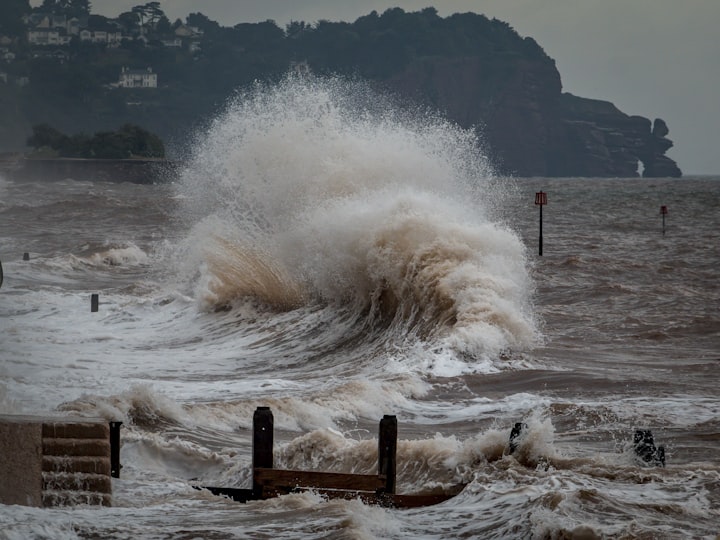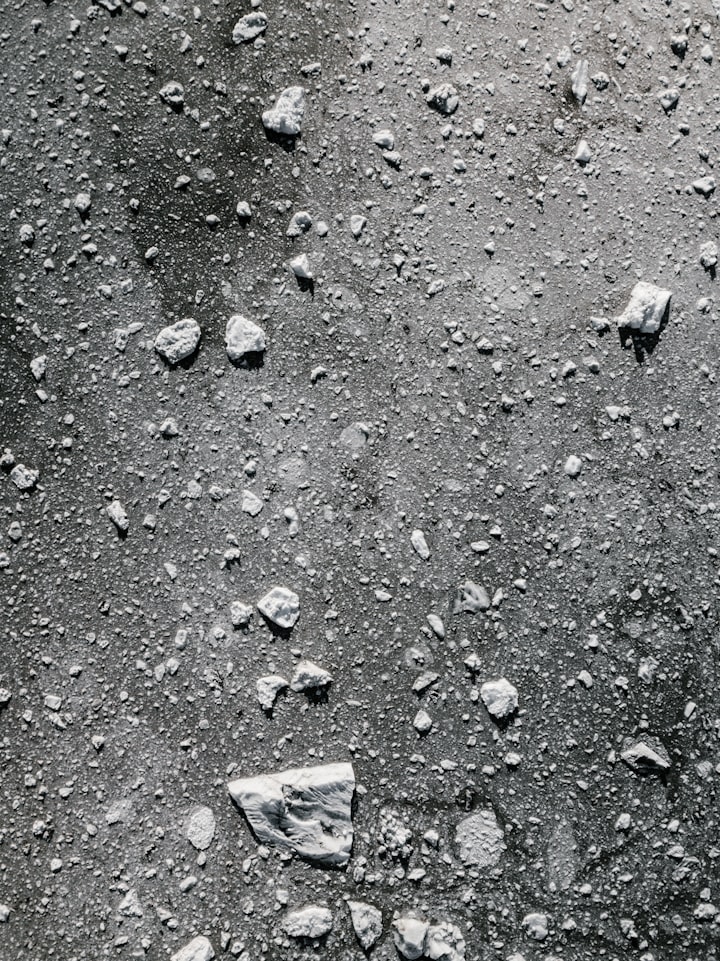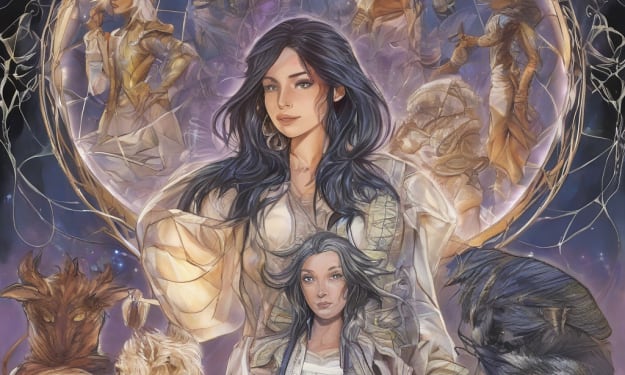That's Not Right, Guy
Arturo was no criminal

Dawn breaks, crows scavenge, weeds strain through cracks in the concrete. A sooty haze chokes the air, tendrils of black smoke rising from the wildfires that scorch the remaining wilderness. Within an hour, heat will make a crucible of the megacity of Cascadia.
Crossing the plaza outside my tenement, I blow sooty black mucus into a small washcloth, remembering with a pang the soft feel of tissue paper. Replacing my mask I press on, ahead of schedule as always.
Fifteen minutes later I present my wrist-display to a security officer manning the inner fortification gate. His eyes are little beads as he scrutinizes my ID.
“L17,” he says.
“Leo Miro. Nice to meet you.”
He flashes me a frosty look and jerks his head, gesturing for me to pass through the gate to the floodplains.
A new batch of Builders arrives today. New faces—small break in the monotony. Crossing the dusty floodplains, a shred of anticipation drifts over me. I reach the seawall site early, in time to find the new Builders still at their breakfasts: processed insect meal, acorn milk, meat of pigeon, Vita-Paste.
Surging tides and rising ocean levels ravage the seawalls, keeping the Builder crews busy. We Observers oversee the work and ensure that the walls will hold during the wet season, when hurricanes thrash the pacific northwest and the ocean slams the shoreline like a pulse cannon.
The Foundation supplies the Builders: “Rehabilitating criminals,” so we are told.
Like the last group, this batch looks soft—nothing like criminals—but, I suppose desperation will push even doves to peck at their own eggs.
Scanning the Builders’ faces, I see something that snatches my breath away: my childhood friend, Arturo sits hunched over his meal, sandwiched in with all the other Builders. Arturo! Close as boys, we drifted and became only distant neighbors in Tacoma, no longer seeking each other out but always waving hello at church and such.
Arturo was no criminal.
Although speaking directly to one of the Builders would be way out of line, curiosity barrels me over, and as I approach Arturo to make sure it is him, I am powerless to resist.
“What the hell did you do to become a Builder?”
Arturo sees me addressing him and after a moment, replies, “Gotta pay my debt, gotta pay the people back for what I did.”
I feel my eyes go wide. Lowering my voice I ask him, “What did you do, man?”
Arturo’s eyes glaze over and without another word he returns to his meal.
“Arturo.”
He lifts his head and turns partway to me.
“Don’t you recognize me?”
Turning the rest of the way around, he replies that he does not, then asks, “Who is Arturo?”
“What the hell is your problem?”
But I have captured the attention of one of the Foundation’s gray-vested guards and, not knowing what else to do, I wave and flash him a huge grin before remembering that my mask covers my mouth. The guard folds his arms and stares me down as I walk away toward my perch above the worksite.
* * *
Arturo and I both knew a man named Gerhard, who led our scout troop when we were boys. Back when travel was still permitted, before the formation of the megacities, Gerhard led us on excursions all over the Northwest, taught us to fish and camp and make caves in the snow. Gerhard showed us all the meaning of kindness, and what it meant to do right.
“Hey that’s not right, guy,” he would say when one of us veered off the path.
We both saw him on his deathbed, many years later. Pallid skin stretched like parchment over Gerhard’s face, his sunken eyes peering out from greenish-black pools. Morphine kept him giddy, but from time to time he would double over and fall silent and when he did, Arturo and I would exchange glances. There were tears in my eyes and I was embarrassed until I saw tears gathering in Arturo’s eyes, too.
I never saw Arturo again after visiting Gerhard that day. But I would never forget his face.
So, how could he not recognize me now?
* * *
It has been three days since I first saw Arturo. That he does not recognize me—that I don’t know why he has become a Builder—is killing me. As the sun sinks, I and a few other Observers shuffle along the dry, dusty floodplains toward the city gates.
What did Arturo do to deserve becoming a Builder? Why would he pretend not to know his name?
Another thought whispers in between my ears: what if he is not pretending?
A distant fwump sounds ahead of us at the city wall. Only pulse weapons make those sounds. I accelerate to a tired trot; but the other Observers just walk.
At the site, a man-sized hole has been punched into the wall, gnarled steel hanging from the perforation like cauterized veins. Through the haze, I see a figure running. For the first time in years, I run, chasing the figure as behind me the orange sun dips behind the Olympic mountains.
Soon I lose my breath—when was the last time I ran? Adjusting my oxygen tube, I glance about and observe that I have entered a covered market, abandoned for the night. Ahead, through the middle of the market, red and blue beacon lights form a cordon. I am not allowed to pass.
I stop, knowing that to proceed any further is to risk punishment—reduced rations, confinement, or reassignment to a much, much worse job.
I should go home.
Who did this? But I know who: it must be the Citizens. They are a menace. Conducting raids, undermining The Foundation. The Foundation builds our seawalls, digs our flood runnels, keeps us dry in the wet season, provides water in the dry season—all by employing criminals who owe a debt to society. It’s a fair system. The Builders owe a debt.
Don’t they?
I should go home. But I do not. Seeing no Peacekeepers I proceed into the cordoned-off area, watching the windows and scanning for movement. A figure moves between two empty kiosks and pauses there. I freeze, then approach after a moment.
But before I get close, a woman’s voice growls at me from behind. “Denizen, your credentials.”
A Peacekeeper.
“Denizen.” The voice behind me is closer, and losing patience.
I wheel about. Before me is an absolute terror with a neck like an oak tree. I peer up at the face—a cinder block with flaring nostrils and a steel clamp jaw. I almost don’t flinch when she demands my credentials again.
“L17… an Observer,” she says when I present my wrist-display for her to examine.
“Leo Miro. Nice to meet—”
“Didn’t you see the perimeter?”
“I must’ve missed it.” I try to hold her gaze but can’t.
“Bullshit. I’m reporting you. Now, screw.” Her vice grip hand finds my arm and she thrusts me to one side, elbowing past me. “Exit the area immediately,” she says as she recedes into the haze.
I watch her go. Within moments a buzz on my auxiliary display tells me I’ve been written up. When I glance at it, the display reads, “10% cut to rations: 15 days.”
Satisfied that the Peacekeeper is gone, I spin around to look for the figure between the kiosks.
There, unmoving, peering through the streaked glass is a man’s face. I stand transfixed. We must both be wondering why I didn’t say anything—this is an enemy, after all. Might have gotten more rations, not fewer.
The enemy is the first to move. He stands, and I register that in his hands is a pulse rifle—aimed at me, at my chest, all this time aimed right at my chest—that at any moment could have thrust a pulse round straight through the kiosk walls and through my rib cage, the very nanosecond that I ratted him out.
Lucky that I didn’t.
Swiveling his head to check his 6:00, he creeps from the kiosk and approaches me, lowering his rifle. We are the same size, but he is strong and slim and kitted with brand new tactical gear and an oxygen mask that shimmers like a jelly fish.
“You’re a Citizen,” I say below my breath.
The man stops short of me and reaches for my wrist display, which he pulls toward himself and scrutinizes. Something mechanical twitches in his eye. He releases my wrist and swivels his head to check behind him again.
“Aren’t you?” I ask. “A Citizen?”
Meeting my gaze for another moment, the man nods at me once, turns, and starts to move away.
I swallow. There is something I want to ask him but I hesitate. He is leaving; it’s now or never. “Hey.”
Mid-step he pauses and glances over his shoulder, saying nothing.
“The Builders. What’s with them?”
Turning back he once more he meets my gaze. Wisps of black hair catch the wind and flutter about his sunburned ears.
“Do they… do something to them? Like, to their minds?”
The man removes his goggles and inches closer to me. His eyes widen and his eyebrows thrust up into his brow. Reaching out, he taps my wrist display twice, then taps his finger to his temple. Then he spins and darts away, fading into the gloomy haze.
What the hell was that?
* * *
Rations come—not cut by 10% but by almost 50! What am I supposed to do with that? It’s not enough to live on!
Dry wind scours the city and I prepare for my walk to the seawall site. In the courtyard I linger in the glow of the early morning sun. I am late, but I don’t want to see Arturo again—seeing him every day with no recognition in his eyes has torn at me, like a crow pecking at my heart.
I finally continue on my way when something on my wrist display beeps. Stopping to study it I discover a pulsing red light superimposed on the screen, just right of center. After several moments, some instinct guides me to turn to my right, and as I do, the light swings in an arc toward the top of the display. I walk forward and the light moves toward the center of the screen. In a false alley between my apartment building and the next, there is a large dump-canister—easy to ignore but totally out of place. Behind this canister, the light on my display finds the center of the screen and suddenly blips off. Then I notice, down at my feet, a rectangular package wrapped in clean, brown paper.
I look around cautiously but this location is perfectly out of view. Crouching, I run my hand along the paper. My heart races.
I can take it to the Peacekeepers, report it, receive a reward. Get all my rations back, plus more! I pick up the package and turn partway around to take it to the nearest officer I can find, but an involuntary image of Arturo‘s face floats before me and I suddenly hear a voice, from our shared past, echo in the space between my ears:
“Hey, that’s not right, guy.”
Gerhard would not abide the selfish things we would do as kids. I think that’s why Arturo and I both went out of our way to say goodbye to him. That’s why it’s killing me that Arturo doesn’t remember who I am—or who he is.
That’s not right.
Crouching back down, I set the package on the ground. I don’t have to turn it in, but I don’t have to open it, either. I can walk away.
But I do not walk away: my heart beating in my throat, I reach for the package and pull at the paper.
Today at least, I will do right.





Comments
There are no comments for this story
Be the first to respond and start the conversation.